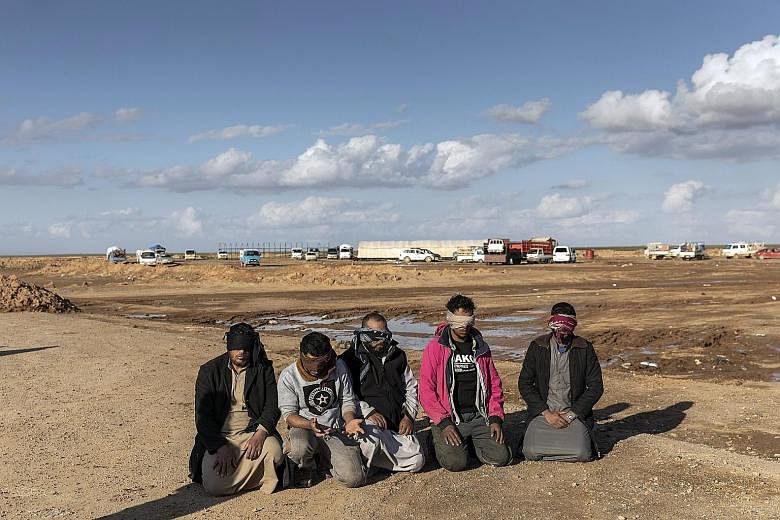WASHINGTON • European nations must take back hundreds of Islamic State in Iraq and Syria (ISIS) group fighters captured in Syria, United States President Donald Trump has said, after a delay in announcing what he said would be the end of the "caliphate".
Mr Trump shocked allies last December by declaring the pullout of roughly 2,000 US troops who had been assisting local forces in Syria against ISIS, whose sole remaining territory is half a sq km in eastern Syria. The impending US pullout set off a countdown for governments whose citizens, having joined ISIS, were captured by the US-backed, Kurdish-led Syrian Democratic Forces (SDF).
"The United States is asking Britain, France, Germany and other European allies to take back over 800 ISIS fighters that we captured in Syria and put them on trial," Mr Trump said in a tweet on Saturday.
"The caliphate is ready to fall. The alternative is not a good one in that we will be forced to release them. The US does not want to watch as these ISIS fighters permeate Europe, which is where they are expected to go."
Once the US-led coalition declares it has taken all ISIS territories, the White House is expected to withdraw American troops.
When that happens, the risk is high that militants will escape SDF control, posing a new threat.
For about two weeks, the Trump administration has been pushing its allies to take their citizens home, and the US said it was ready to help in the repatriation, but time has been running out.
Several countries, including France, that have chosen to leave the extremists in SDF detention now confront a diplomatic, legal, political and logistical puzzle.
"We do so much, and spend so much - time for others to step up and do the job that they are so capable of doing. We are pulling back after 100 per cent caliphate victory!" Mr Trump said in his tweets late on Saturday.
Last Friday, he said announcements on the fall of the caliphate would be made "over the next 24 hours", but that deadline came and went. An SDF commander said his US-backed forces slowed their advance to protect civilians.
The militants declared a "caliphate" in large parts of Syria and neighbouring Iraq in 2014, but have since lost all but a tiny patch of territory near the Iraqi border.
Mr Trump's Syria pullout has highlighted the deep transatlantic rift that emerged under his presidency, and the differing views of the two sides were on display on Saturday at a security conference in Munich.
A French government source criticised the Trump administration's approach as "we're leaving, you're staying", and added: "They're trying to manage the consequences of a hasty decision and making us carry the responsibility."
But the US special envoy for Syria said yesterday that the US will not make an abrupt and rapid withdrawal of its troops from Syria and will consult closely with its allies on the issue.
"We've been telling them (allies) continuously this is not going to be an abrupt, rapid withdrawal but a step-by-step withdrawal," Mr James Franklin Jeffrey told the Munich Security Conference.
Die-hard extremists have blocked roads out of the last scrap of their "caliphate", US-backed forces fighting them said yesterday, preventing hundreds of civilians from fleeing.
Thousands of people have streamed out of the so-called "Baghuz pocket" in recent weeks, but hundreds of civilians - including ISIS family members - are believed to still be inside.
At a collection point for new arrivals outside Baghuz yesterday, dozens of tents and a few trucks sat empty.
Last week, the area had been thronging with people - women and children, but also suspected militants who were led to one side.
"It's been two days since anyone came out," an SDF fighter said.
SDF spokesman Mustefa Bali said ISIS had blocked roads out of its holdout, preventing those remaining from escaping to safety.
"Daesh has sealed off all the streets", but up to 2,000 civilians could still be inside, he said, using an Arabic term for ISIS.
The extremists are confined to "a few hundred sq m in... Baghuz with a number of civilians they hold hostage and refuse to release", he said on Twitter on Saturday.
A spokesman for the US-led coalition, which has been backing the SDF with its air power and some troops, said ISIS was using these women and children as "human shields".
AGENCE FRANCE-PRESSE, REUTERS

